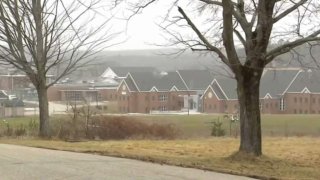
Attorneys for New Hampshire's state-run youth detention center are suggesting that a man who claims he was physically and sexually assaulted by multiple counselors as a teen was partially responsible for at least some of the alleged abuse.
David Meehan sued the Sununu Youth Services Center, the agencies overseeing it and half a dozen former employees in January 2020 alleging that he endured near daily beatings and rapes in the late 1990s at what was then called the Youth Development Center. More than 300 men and women later came forward with similar allegations spanning six decades, but a judge dismissed their class action lawsuit in May, and their attorney is now preparing hundreds of individual lawsuits like Meehan's.
WATCH ANYTIME FOR FREE
>Stream NBC10 Boston news for free, 24/7, wherever you are. |
The attorney general's office, representing the youth center, filed its first response to Meehan's lawsuit late Friday night, citing Meehan's "contributory negligence" as a defense. Without elaborating, it also said some of Meehan's claims are barred because the staff's actions were "justified or excused" as necessary to maintain order and to protect the safety of the facility, its staff and residents.
"Contributory negligence is nothing more than the state's way of saying that I am to blame for the horrendous torture, rape and abuse I endured at the hands of their systems, institutions and employees," Meehan, 39, said in a phone interview Saturday. "These people were allowed to do the unthinkable and get paid for it, and now they're being protected, while me and my family suffer."
Get updates on what's happening in Boston to your inbox. Sign up for our >News Headlines newsletter.
In addition to physical and sexual abuse, Meehan also alleges that he was repeatedly held in solitary confinement and denied an education. The state didn't specify which claims it was referring to, and Assistant Attorney General Jennifer Ramsey declined to comment Sunday.
In its written response, the state denied Meehan's broad accusations that negligence in hiring, training and supervising workers led to abuse and that it failed to either properly investigate allegations or remove perpetrators. It also denied that officials intentionally concealed information from law enforcement.
With regards to Meehan's specific abuse allegations, however, the state repeatedly said it lacked sufficient information to either admit or deny the claims. For example, the state confirmed that Meehan asked to see a nurse in 1998, but neither confirmed nor denied his account that the nurse told him his bruised face and broken nose appeared self-inflicted. It confirmed his trip to the hospital after another incident, without admitting or denying that he had passed out on a softball field during a violent rape.
Meehan's attorney, Rus Rilee, called the state's defense shocking and insulting to Meehan and other victims.
"The state's position that David contributed to his own abuse — beatings, rapes and solitary confinement — and that the abuse was in some way justified, is quite simply appalling," Rilee said Saturday. "To blame any survivor, let alone a child, for the sexual and physical abuse they suffered is disgusting, and the state should be ashamed of itself."
Rilee represents more than 300 men and women who say they were physically or sexually abused as children by 150 staffers from 1960 to 2018, including gang rapes, being forced to fight each other for food and being locked in solitary confinement for weeks or months. The recently-adopted state budget calls for closing the center by March 2023 and replacing it with a much smaller facility.
Criminal charges have been brought against several of the staffers Meehan accused of abuse. While one division of the attorney general's office has been defending the state against the lawsuit, the criminal division launched a broad investigation into the center and its operations in 2019, and 11 former staffers were arrested in April. Three of them were charged with sexually assaulting Meehan and one was charged with serving as a lookout. But in its response to the lawsuit, the state said it lacked sufficient information about those allegations.
The Associated Press does not identify victims of sexual assault unless they choose to identify themselves publicly, as Meehan has done. He argues there is plenty evidence to back up his claims.
"They've had more than enough time to investigate and figure out who's telling the truth and who's not telling the truth," he said. "They know. They're just looking for a way out."



